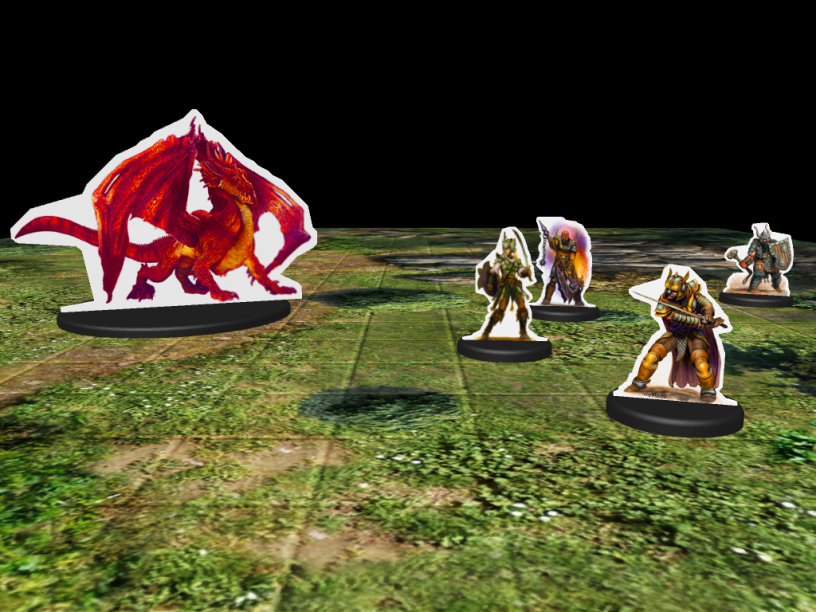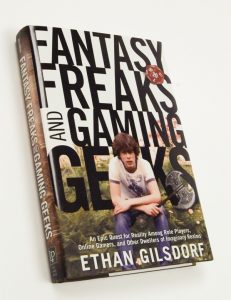As I have previously stated, there are many pros to online GMing. But as some of you have pointed out, there are limitations as well. I don’t call them “cons” for two reasons: (1) limitations can be overcome with some compensation, while (2) true cons are inherent and unavoidable. In today’s article, I want to discuss the limitations placed upon communication when GMing online.
game

How to not ruin your RPG session
You know what ruins an RPG session? When the rulebooks get opened up. You know what ruins it the most? When the GM is the one opening the book.
While my point could be applied to “rules lawyering,” I’m actually hitting at a more present problem at my gaming table: lack of familiarity with core rules. As you know, I’ve embarked on a quest to play through many of the classic 1st Edition AD&D modules. We have one session remaining in T1: The Village of Hommlet by Gary Gygax. That means after a solid ten sessions, we’re still having to look at rules. Why is that?
Of course, there is the charge that 1st Edition is too complicated, contradictory, and clunky. Granted, it is complicated. There are moments of fuzziness to the point of possible contradiction. But there’s a charm and personality about the system that helps me to overlook all that. I’m enamored by the tone of the game.
Beyond the quirks of 1st Ed. AD&D, I think that there are some rules that are simply hard to remember when you first begin playing any game. They’re not on the GM screen–they’re not readily available–nobody remembers! And, as a result, you can find yourself digging through your books at the gaming table more than is necessary.
So here’s my solution!

Photo by Dean Hochman
Post-it notes! That’s right. It’s simple, it’s easy, find those finicky rules quickly if they’re absolutely needed at the table. The problem is less the books and more the fifteen minutes finding the rules.
So grab a pack of post-its, whatever RPG book you’re learning right now, and let’s mark our pages together. Ready? Here are the top pages that you need to mark right now:
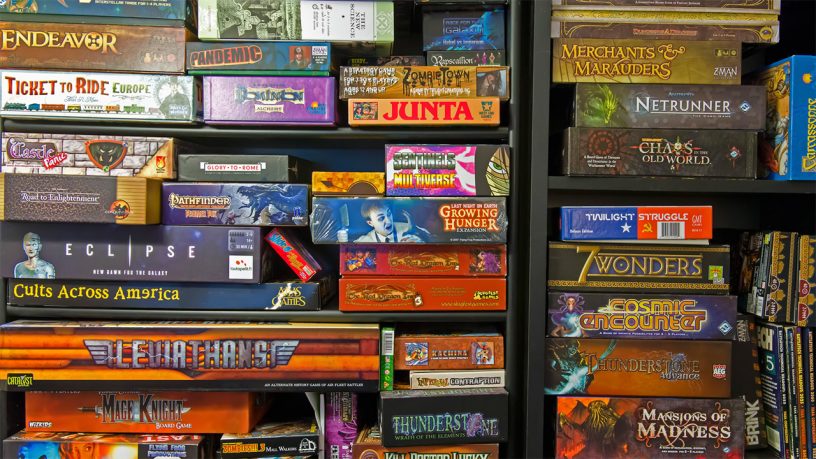
What’s your next new game going to be?
Do you know how many new games I want to be playing right now? Let me name a few.
Star Wars: Destiny releases this Friday.
I’m reading the 2nd Edition Mouse Guard RPG book right now (it’s awesome).
D&D 5th Edition is calling my name, even though I’m absolutely mesmerized by AD&D 1e.
And let’s not even bring up the board games, like Betrayal at the House on the Hill or Star Wars: Imperial Assault!
Here’s the problem with all these cool games out there: what if I invest time, attention, and energy into a game that I end up disliking? Is it just going to sit up there on my shelf unplayed? Am I going to wish I hadn’t bothered in the first place? In the end, it seems like finding games that fit me should be easier!
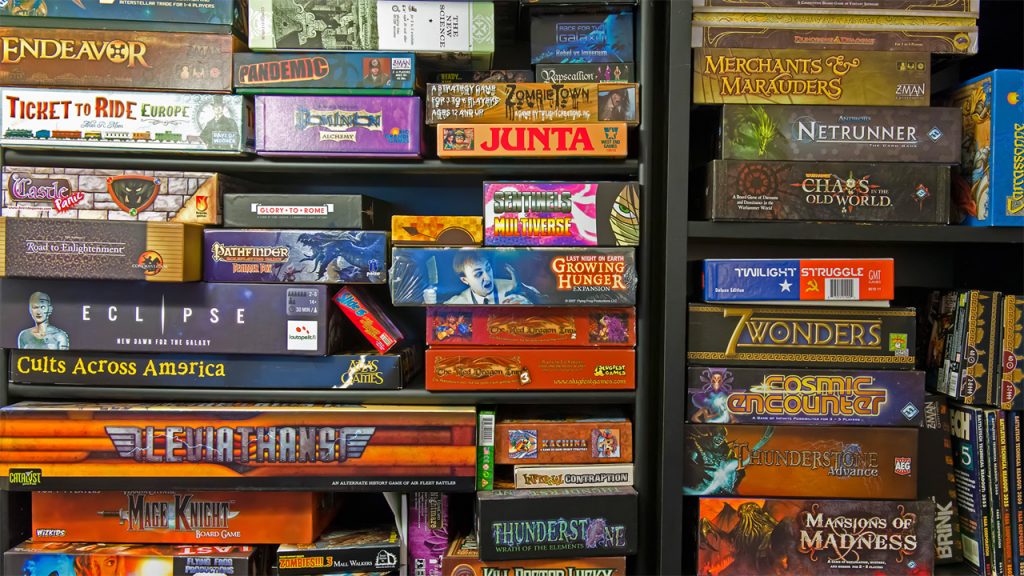
But hear me clearly: it doesn’t have to be this hard to find a new game to enjoy! Here’s how you can pick a new game that will not only deepen and diversify your fun, but possibly even strengthen your local gaming community:
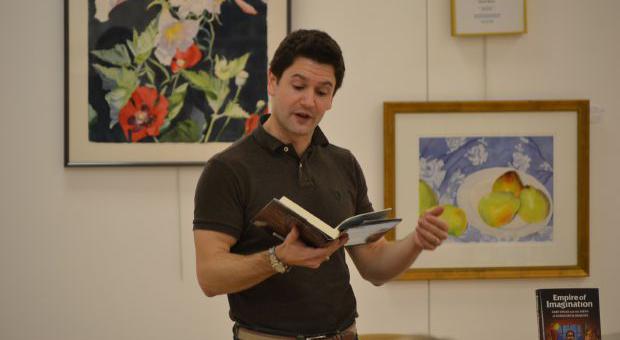
How gamers can become readers…which they should!
Reading is an absolute necessity for creators. And that applies to Game Masters and game players as much as it does to any other creative!
But if you’re like me, a grown-up gamer who is already juggling family, work, and gaming, it can be hard to find the time to read. And therein lies the problem. My creative juices flow better when I read. I feel more engaged and “in touch” with the world when I read. But when I don’t read? Well, let’s say it leaves the creative fields of my mind fallow.
Shouldn’t it be easier to develop ourselves intellectually? Shouldn’t regular reading be a simple discipline to develop? You will develop a healthy habit of reading if you follow the process that I followed. I read every day at work (that’s not a discipline…that’s work). But I also read for myself at home. And you can too! Here’s how you can develop the same practice: Continue reading
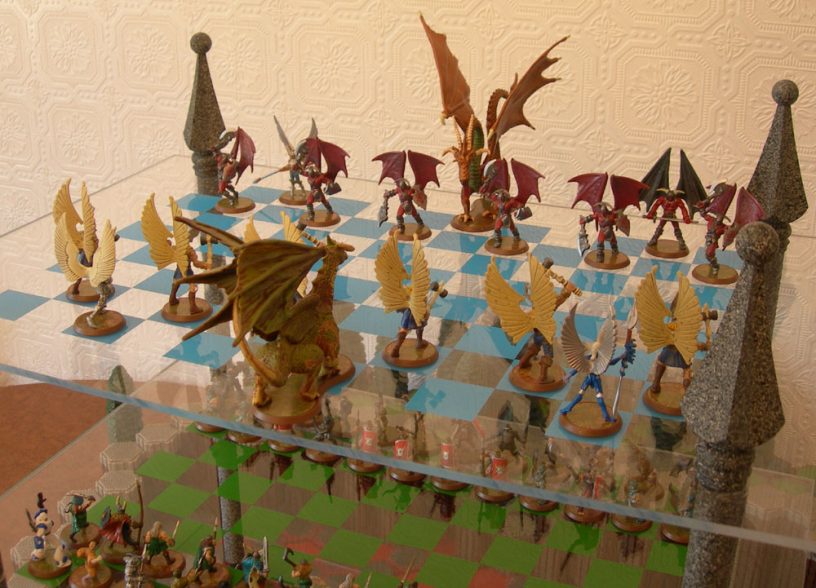
Learning from Gary Gygax: Gaming Variety
This blog is the second in a series inspired by Michael Witwer’s Empire of Imagination: Gary Gygax and the Birth of DUNGEONS & DRAGONS.
You might be surprised to learn that Gary Gygax played games other than Dungeons & Dragons. While he certainly enjoyed D&D, he was an avid chess player and war-gamer. And, of course, he always had new games brewing in the back of his mind.
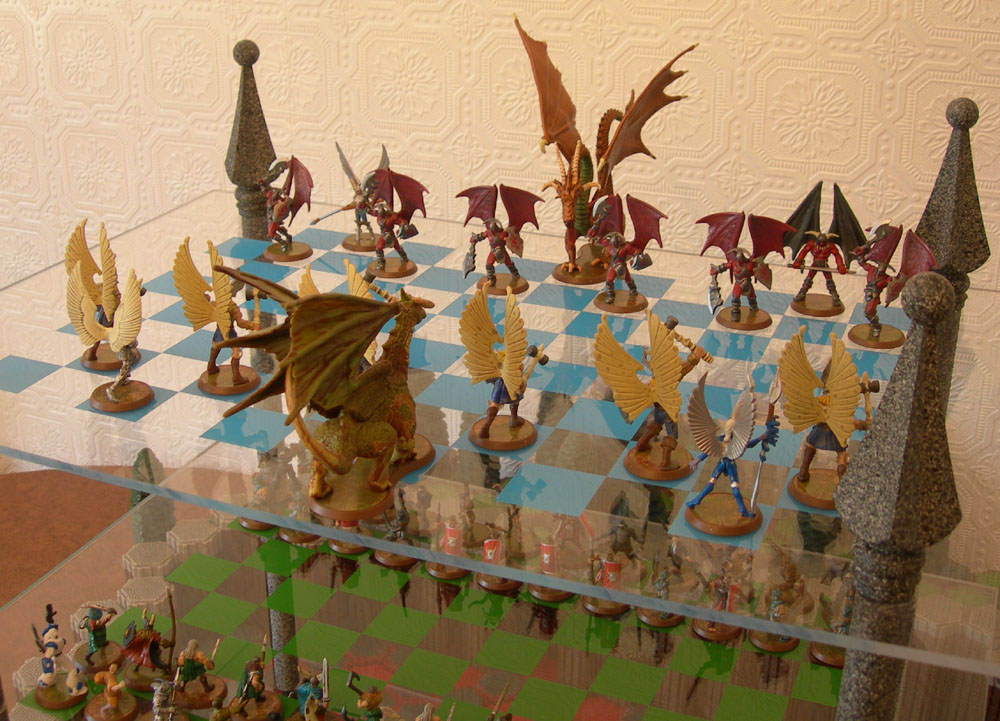
One of Gary’s creations, Dragonchess (Photo credit: Zac Dortch)
While consistency is certainly key for a gaming group, some level of variety is necessary to keep players interested. You need to swap out GMs from time-to-time. Different games on the table keep people interested. Even a change in locale can spice things up a bit (hosting can get tiresome too!).
So by way of recommendation, here are the top six games that I think should grace your tabletop, if not as a permanent fixture, then as an occasional change of pace:

How can you keep your players engaged and excited?
What was the last movie that you saw?
I’m ashamed to say it was Ted. Yes, the Mark Wahlberg movie with Peter Griffin talking for a foul-mouthed, pot-smoking teddy bear. I was getting over a stomach virus. I needed a laugh. So sue me!

Enough about me, what was the last movie that you saw?
Twenty bucks says you had a pretty good idea how the movie would end well before it ended! Stop and think about it. Most movies forecast the end, so that we anticipate the ending in advance. And until that expected ending comes, we’re on the edge of our seats.
But what does that have to do with gaming? A LOT. Game Masters have a lot on their plate. And one of those responsibilities is keeping their players engaged. How can we utilize this same technique used in most movies to keep our players on the edge of their seats?
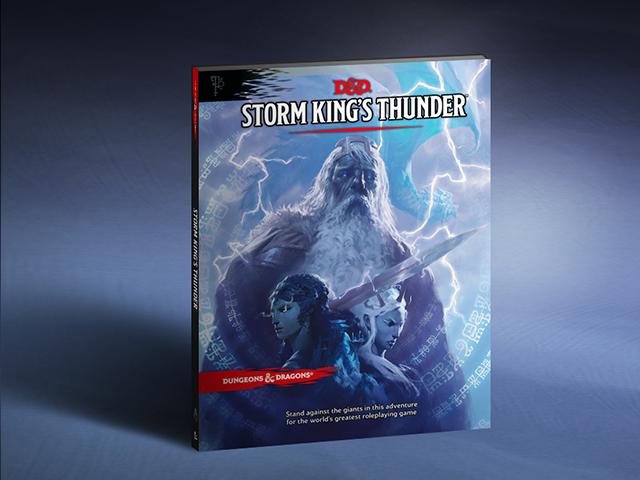
What Adventure Should You Run?
D&D 5th Edition is finally coming of age. If you’re a DM just getting into the game (like myself), you have a short time before you hit option overload. The number of quality modules and campaigns being published by WotC and through the DM’s Guild is quickly getting to a saturation point, if you haven’t been working through them already.
As a DM, though, you really want to present the best gaming experience that your players can have. So where and how should you start? With the Starter Kit? With the sweet new Storm King’s Thunder campaign? Or perhaps with something new, original, and creative?
Rather than recommending a resource to you, I want to do you one better. I to help you, Dungeon Masters and Game Masters, to find your own personal game style and to choose accordingly. Here’s how:
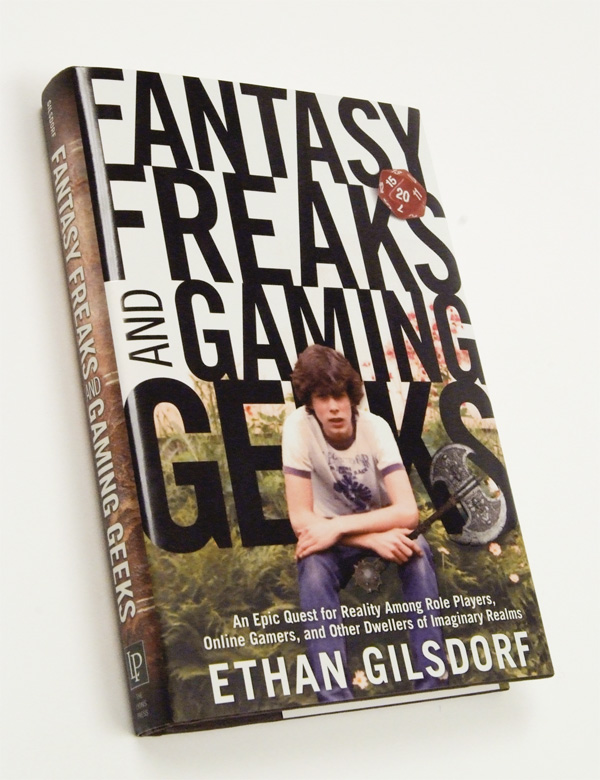
Does growing up mean giving up gaming?
“Fantasy as a cultural phenomenon felt vaguely unsettling to me. I wondered if pervasive escapism had infantilized an entire generation.”
So began a quest for Ethan Gilsdorf, journalist and geek par excellence. The quest: to explore every form of fantasy roleplaying games, in order to discern whether they are healthy entertainment for responsible, balanced, functional adults. He raises the same question that I’ve posed before: does growing up mean giving up gaming?
The result of his search is the fascinating book Fantasy Freaks and Gaming Geeks. I devoured the book very quickly and I commend it to you.
In the end, Gilsdorf names a number of reasons that tabletop RPGs in particular are healthy activities for adults–they encourage problem-solving, team-building, and creative thinking, for starters. That said, I have a followup question:
If playing tabletop RPGs is so healthy for adults, why is it so hard to find a group to play in?
I’m blessed to live in an area with an active gaming community. But I know that for many of you, that’s not the case. What’s to be done for those who lack that resource nearby?
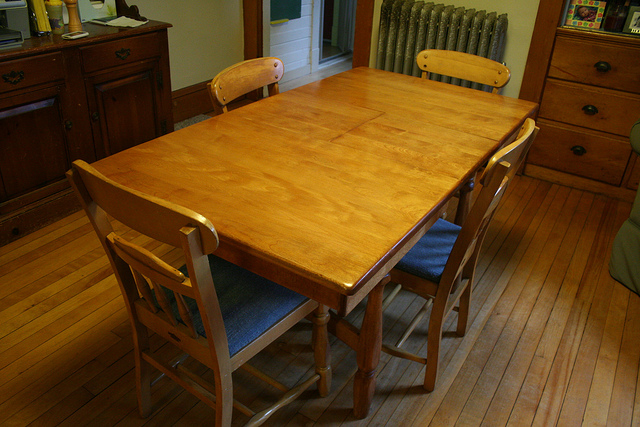
Get your game on the table!
What’s that over there on your shelf? You know, the dusty game you bought a while back that never seems to make it onto the table!
Wait, what’s that? Nobody wants to play it?
I find that hard to believe. Because, I mean, you want to play it, right? Of course! Otherwise you wouldn’t have bought it.
So my question to you is: if you want to play, there have got to be 3-6 other people on the planet who want to play it too. Fair assumption?
Regardless, here we sit with an empty table and a dusty game.

Photo: Abigail Batchelder
Listen, I get it. I mean, I’m the guy learning AD&D 1st Edition when D&D 5e is the hottest thing in town! Even I was at my FLGS tonight flipping through those shiny, sexy 5e books. But let’s not get distracted.
You’ve got a game you want to play. So how are we going to get your game on the table?

The DMs Guide to Session Planning
DMs, do your players always take the path of most resistance? Or are they content to sit in the local tavern for four solid hours, roleplaying and digging up so much information that you never could have prepared for it? Or maybe they simply murder hobo through every NPC you carefully crafted. Here’s my point:
Campaigns never go according to plan, if you plan.
As DMs who are trying to juggle family, jobs, other responsibilities, and gaming, it can get frustrating. I mean, is there any point in planning at all?
I believe there is a point to planning within limits. And it all starts with having the right attitude. You need to make a plan in order to break it. You heard me right. Plan with the expectation and intention of breaking that plan.
The path your campaign takes will never be straightforward and simple. It will be twisted and complicated with lots of course correction. So here’s how you can plan for that without losing your sanity:

